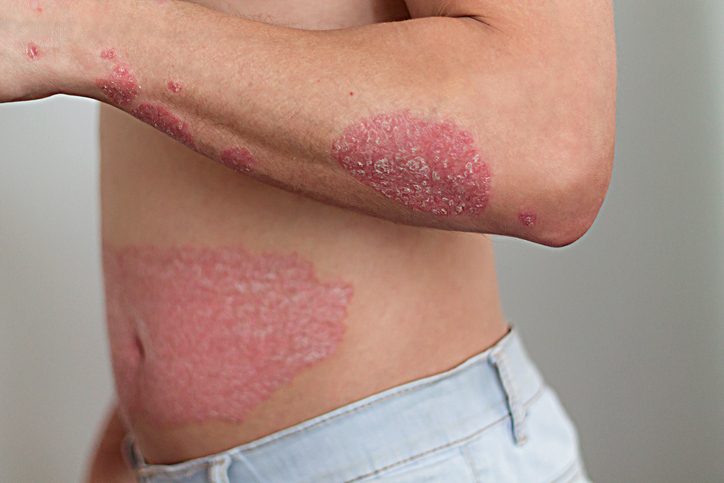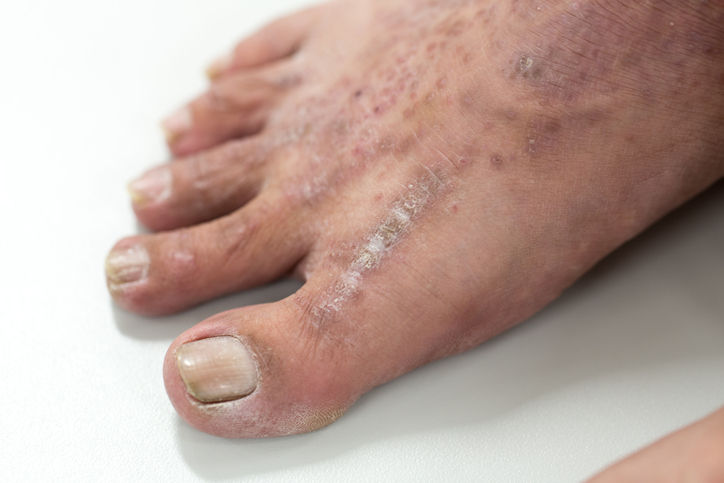Psoriasis Treatment in South Miami, FL
If you are looking for Psoriasis treatment in South Miami and the surrounding areas, call 305-740-6181 today to consultation with the experienced dermatologists of the Skin Center of South Miami! Our providers can review your case, answer any questions you have, and help you determine whether you are a candidate for treatment.
What are the first signs of psoriasis?
The first noticeable signs of psoriasis may vary from person to person. However, most will notice some level of dry, itching, and red skin. Depending on the type of psoriasis you have, you might also notice some of the below symptoms that are specific to each psoriasis condition:
Plaque Psoriasis Symptoms
- Dryness
- Redness
- Pain
- Silver or white scales
- Patches of raised skin
- Rashing
Inverse Psoriasis Symptoms
- Redness
- Smooth skin that is red
- Skin swelling
- Skin irritation (especially if sweating or friction occurs)
Pustular Psoriasis Symptoms
- Redness
- Blistering
- Tenderness
- Temporary rashing
- Symptoms that onset quickly
Nail Psoriasis Symptoms
- Loosened nails
- Pitting nails
- Crumbled nails
- Abnormal nails
- Discolored nails
Guttate Psoriasis Symptoms
- Scales on the skin
- Lesions on the skin
- Rashing (especially after strep throat or another infection)
Erythrodermic Psoriasis Symptoms
- Flaking
- Peeling
- Burning
- Itching
- Redness
Where does Psoriasis usually start?
The location of your psoriasis is largely dependent on the type of psoriasis you are suffering from. Here are the areas of the body that are affected by the different types of psoriasis:
Plaque Psoriasis
Anywhere on the body
- Arms
- Legs
- Face
- Neck
- Hands
- Feet
- Back
- Stomach
- Eyelids
- Genitals
- Inside the mouth
Inverse Psoriasis
- Armpits
- Below the breasts
- Groin
- Genitals
Pustular Psoriasis
- Smaller areas of the body
- Hands
- Feet
- Fingers
- Toes
- Fingertips
- Tips of toes
Nail Psoriasis
- Only on the nails
- Toenails
- Fingernails
Guttate Psoriasis
- Arms
- Legs
- Forehead
- Scalp
Erythrodermic Psoriasis
- Entire body (usually covers the majority of your skin)
What is the main cause of psoriasis?
Doctors don’t currently know the exact cause of psoriasis, but most agree that it is related to an autoimmune system problem. Once someone has psoriasis, it can come and go periodically throughout a person’s life. For those who have psoriasis, there are certain triggers that seem to cause the outbreaks or flare-ups to occur. These psoriasis triggers can vary for everyone, but may include:
- Alcohol
- Lack of vitamin D
- Stress
- Smoking
- Certain medications
- Blood pressure medications
- Beta blocking medications
- Antimalarial medications
- Bipolar disorder medications
- Infections
- Skin infections
- Strep throat
Speak with one of our psoriasis experts at the Skin Center of South Miami for a more comprehensive list of the possible triggers for psoriasis. Our dermatology center has treated many patients with varying types of psoriasis and can help you overcome your symptoms and get back to your normal, healthy-looking skin.
Is Psoriasis caused by stress?
Often, patients wonder about the link between stress and psoriasis. Does stress automatically trigger a psoriasis outbreak? And how do people with psoriasis manage stress to avoid an outbreak? Unfortunately, there is no simple, one-size-fits-all answer to these questions. While there is a link between stress levels and psoriasis flare-ups, it can be very different depending on the person, the severity of their psoriasis, and the type of psoriasis they are suffering from. Some of the things you can do to ease your mind and help keep your stress levels under control when dealing with psoriasis include the following:
- Visit a dermatologist when you notice signs of psoriasis. Your dermatologist will help you determine the exact type of psoriasis you have, medications that may help you, and triggers you should avoid. They can also help put your mind at ease about your condition, which can reduce some of the added stress you may be feeling.
- Try taking a walk or meditating to help control your everyday stress levels. Not only can these activities help your body stay in good shape, but they can also help to clear and calm your mind.
- Trust your dermatologist and be open to new treatments. Your doctor is constantly learning about the best treatment options for psoriasis and can help steer you toward a better option when your psoriasis is not getting better with other treatment options.
How do you stop psoriasis from spreading?
Contrary to common belief, psoriasis is not contagious and cannot spread from one person’s skin to another. Psoriasis can only occur in someone who already has the skin condition. However, psoriasis can spread to other areas of the body for someone who already suffers from the condition.
Psoriasis Triggers
In order to keep psoriasis from spreading to other areas of your body, avoid these common triggers:
- Stress
- Cigarette smoke
- Dry weather conditions
- Humid weather conditions
- Intense sunlight exposure
- Infections
- Illnesses
- Rough clothing textures
Does psoriasis ever go away?
Psoriasis is considered a chronic condition that can come and go throughout your life. Many people turn to a trusted dermatologist, who they can visit when they are experiencing a psoriasis outbreak. Psoriasis may go into remission with proper treatment, which means a person does not experience symptoms of the condition for months or even years in some cases. In order to help keep psoriasis in remission for longer periods of time, many will turn to diet and exercise changes to help boost their immune system. Speak with your dermatologist to learn more about diet and lifestyle changes that could help keep psoriasis in remission longer.
What happens if psoriasis goes untreated?
Unfortunately, there are some complications to psoriasis, which could be serious in some cases. This is especially true for patients who suffer from a certain kind of psoriasis that affects the joints. In those cases, the effects of psoriasis could eventually lead to:
- Stroke
- Heart attack
- Joint stiffness
- Psoriatic arthritis
What are the treatment options for psoriasis?
There are several dermatology treatment options that can help improve the symptoms of psoriasis and keep the condition in remission using medication or procedures. Visit the Skin Center of South Miami to learn more about all of your skincare options and the benefits of each treatment. Some of the many psoriasis treatments that you may be a candidate for include:
- Prescription psoriasis creams
- Phytotherapy for psoriasis
- Psoriasis injection therapies
- Oral medications for psoriasis
Check Out Our Blog for Psoriasis Treatment Tips
What are the best ways to treat nail psoriasis? »
How Can the XTRAC Laser Help With My Psoriasis? »
Schedule A Psoriasis Treatment Consultation In South Miami, FL!
If you are interested in learning more about psoriasis prevention and treatment, visit our experienced dermatologists at the Skin Center of South Miami. Our providers are experts when it comes to treating psoriasis and are dedicated to delivering personalized dermatology care for every patient, no matter how big or small your concerns are. Call us at 305-740-6181 or fill out the form on this page to schedule a consultation today.

 Anywhere on the body
Anywhere on the body
